

“The rich steal our beaches,” reads a sign at beach protest in Ocean Park, San Juan, Puerto Rico, on January 29, 2022. (Carlos Edill Berríos Polanco/Latino Rebels)
SAN JUAN, Puerto Rico — After a video of a couple berating beachgoers in Ocean Park while they set up a tennis court went viral on social media last week, Puerto Ricans rallied to host a “beach Olympics” to show that “the beaches belong to the people.”
“Buy a million-dollar house, then you can give your opinion here,” the unidentified woman in the video told Lydibett Santiago, the woman filming.
“When I saw what happened and the public response, I said we have to do something to take advantage of the situation and that’s an opportunity for us to come together as a community,” Wilmar Vázquez, the event’s organizer, told Latino Rebels “Coastal conservation. That’s the message we’re trying to send. Coastal conservation and that sports are unity.”
In the four days between the video going viral and the tournament, Vázquez organized both a beach tennis tournament and a beach block party that brought hundreds of Puerto Ricans to peacefully protest while enjoying the archipelago’s most prominent natural resource: the sea.
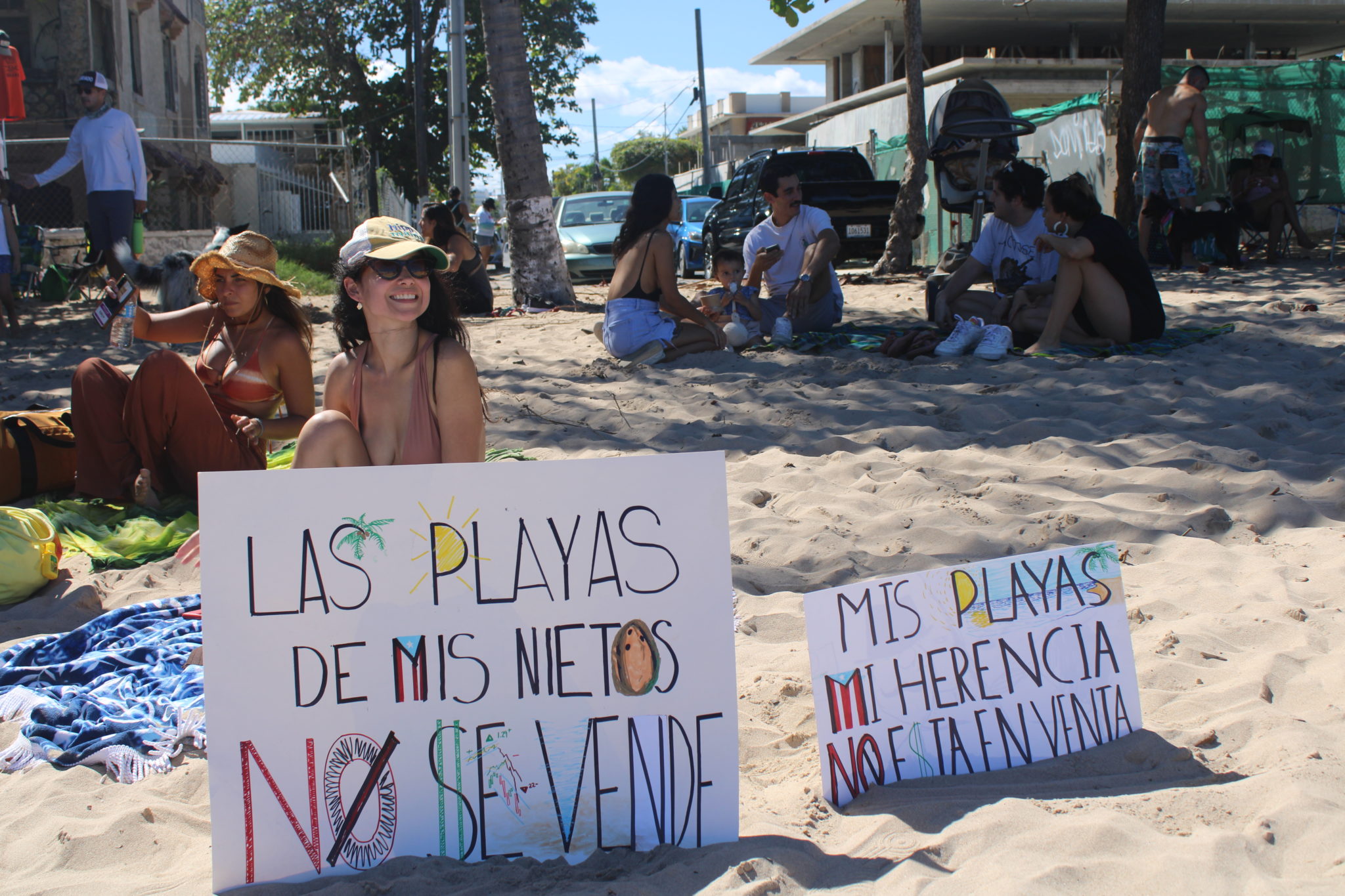

“My grandchildrens’ beaches are not for sale,” reads a sign at beach protest in Ocean Park, San Juan, Puerto Rico, on January 29, 2022. (Carlos Edill Berríos Polanco/Latino Rebels)
Over a dozen beach tennis courts were set up along the beach for anybody who wanted to participate in the tournament or just wanted to play. Anybody who wanted to come hang out was also invited. Spots for beach volleyball, beach hockey, and air aerobics were also set up along the beach by community members. Food and refreshments were donated by community members.
@latinorebelstiktok More from #oceanpark protest in #puertorico??
“I believe that there are perhaps many people who live alienated from the blessings we have and the importance of uniting as a community,” said Vázquez. “We don’t have to restrict access to anyone because this belongs to everybody. If we all take care of it, then we can all enjoy it. The community came together to show that that’s unacceptable. The beaches are a resource for everybody and we’re going to enjoy it.”
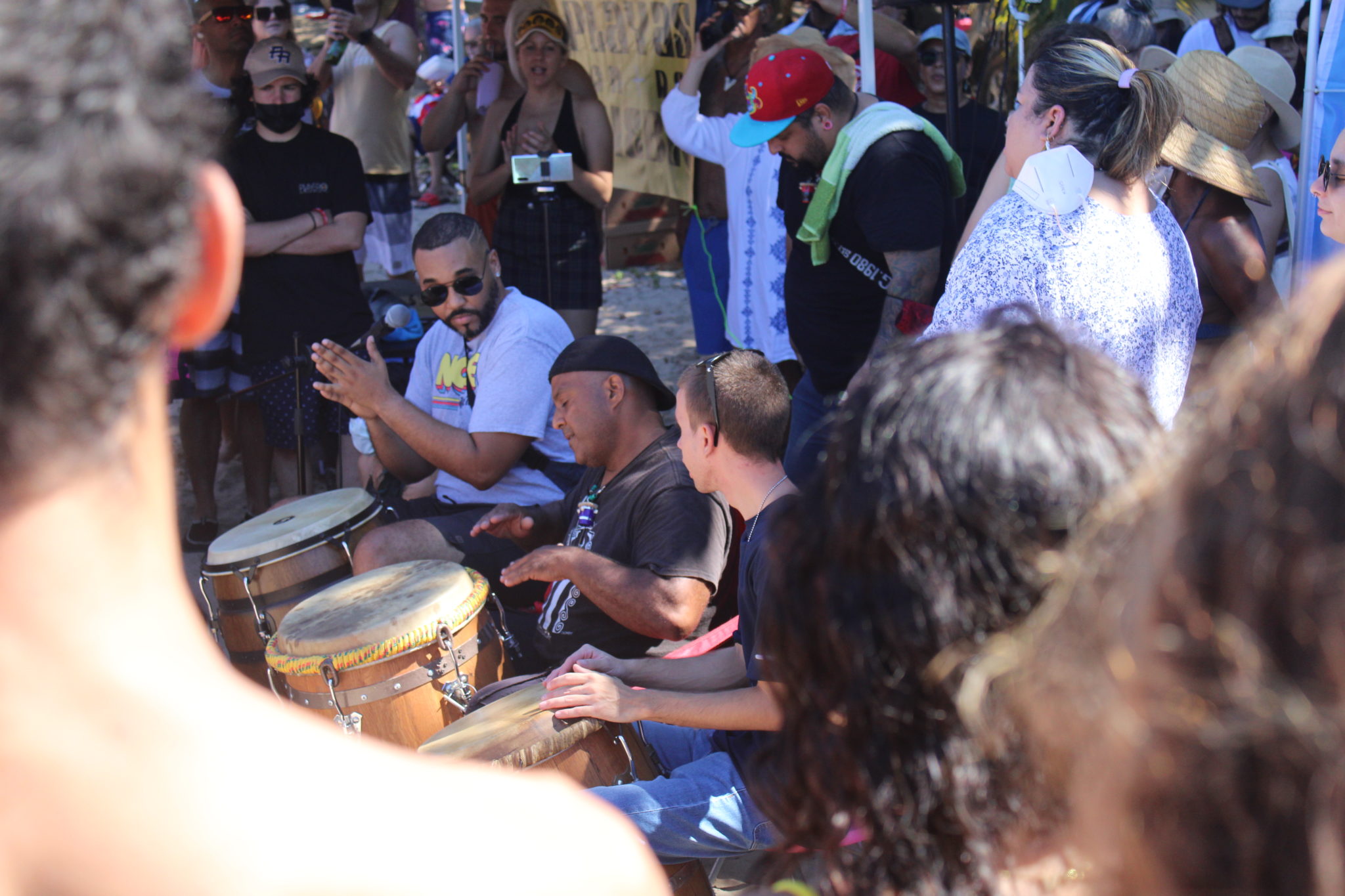

Photo by Carlos Edill Berríos Polanco/Latino Rebels
“Even if they make fun of us because we’re poor, we’re going to fight because businesspeople nor privileged people have the right to limit our access to the beaches,” Herminio Pagan Calderín told Latino Rebels. Pagan Calderín is a member of Surfers Locales La 8, which advocates for the rescue, conservation, and free access to El Escambrón beach near Old San Juan.
“We need to continue supporting these causes and we have to continue joining together, he said. “If not, our children, our grandchildren will be slaves to those that want to control the beaches.”
San Juan’s Ocean Park neighborhood has been a prime location for real estate investors over the past decades, and it is now a prominent site for the wave of gentrification washing over the island. Advertisements scattered throughout the neighborhood advertise empty lots starting at $1.9 million. Many of the houses currently for sale in the neighborhood sell for upwards of $3 million.
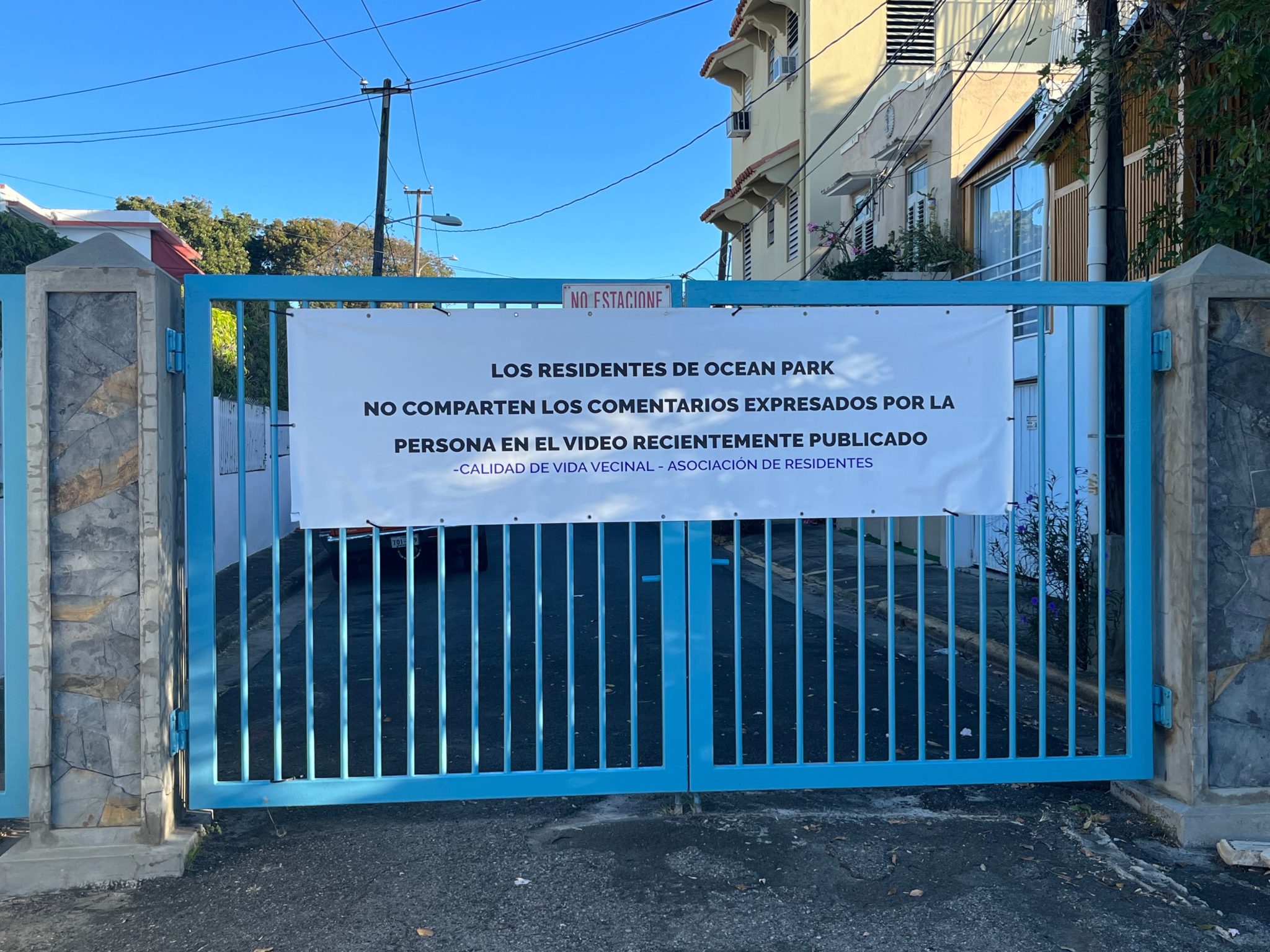

The residents of Ocean Park do not share the commentary expressed by the person in the recently published video,” reads a banner posted by the Ocean Park Board for Neighborhood Quality. (Carlos Edill Berríos Polanco/Latino Rebels)
“The residents of Ocean Park do not share the commentary expressed by the person in the recently published video,” read multiple banners posted by the Ocean Park Board for Neighborhood Quality at every gate leading into the neighborhood.
As first reported by journalist Jonathan Lebrón Ayala on Twitter, the board had sent out messages to residents promising to implement “necessary security measures” due to the increase in cars and beachgoers moving through the neighborhood. While multiple vehicles were ticketed, police presence was not out of the norm for the area.
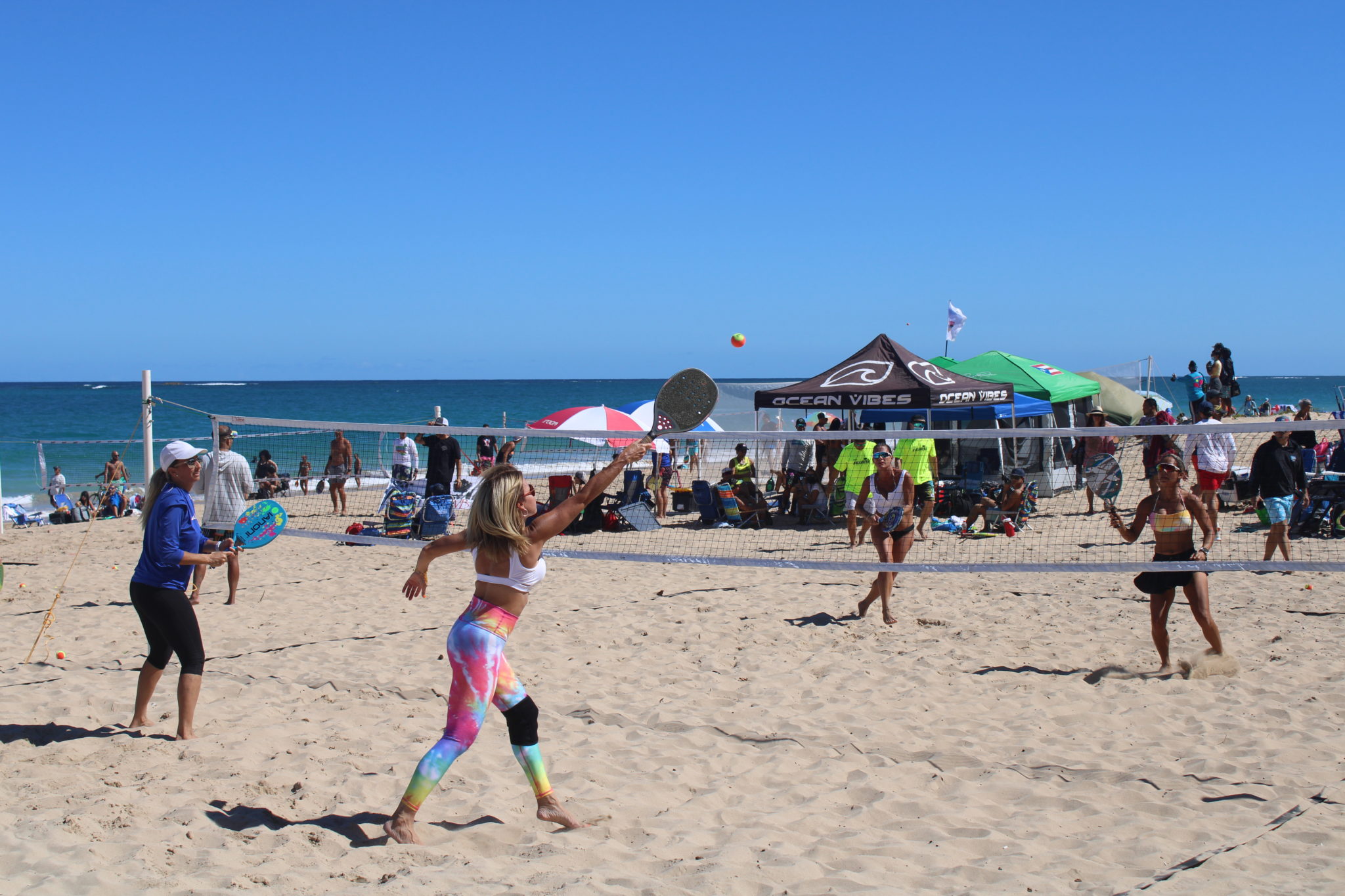

A beach tennis tournament was held to protest privatization in Ocean Park, San Juan, Puerto Rico, on January 29, 2022. (Carlos Edill Berríos Polanco/Latino Rebels)
Beach tennis players started playing early in the morning and continued late into the afternoon. Throughout the day, tournament participants happily proclaimed that they had a “great time” and came to “enjoy Puerto Rico’s natural resources.”
While the main focus of the day was the beach tennis tournament, many people who had simply come to observe the event said they came to enjoy the sun. One beachgoer told Latino Rebels they came to show “Puerto Rico’s beaches aren’t for sale.”
@latinorebelstiktok Today at the #oceanpark beach protest in #puertorico??
“The fight brought us here. The indignation we feel because of the government and the beaches brought us here,” said Carlos Gonzalez, a farmer who had come down from Adjuntas to support and sell fruit.
Puerto Rico’s beaches are all free for public use, but the past decade has seen an increase in beaches that are mostly inaccessible to the general public because of the fees needed to pay for parking or because the only access point is through gated communities or hotels.
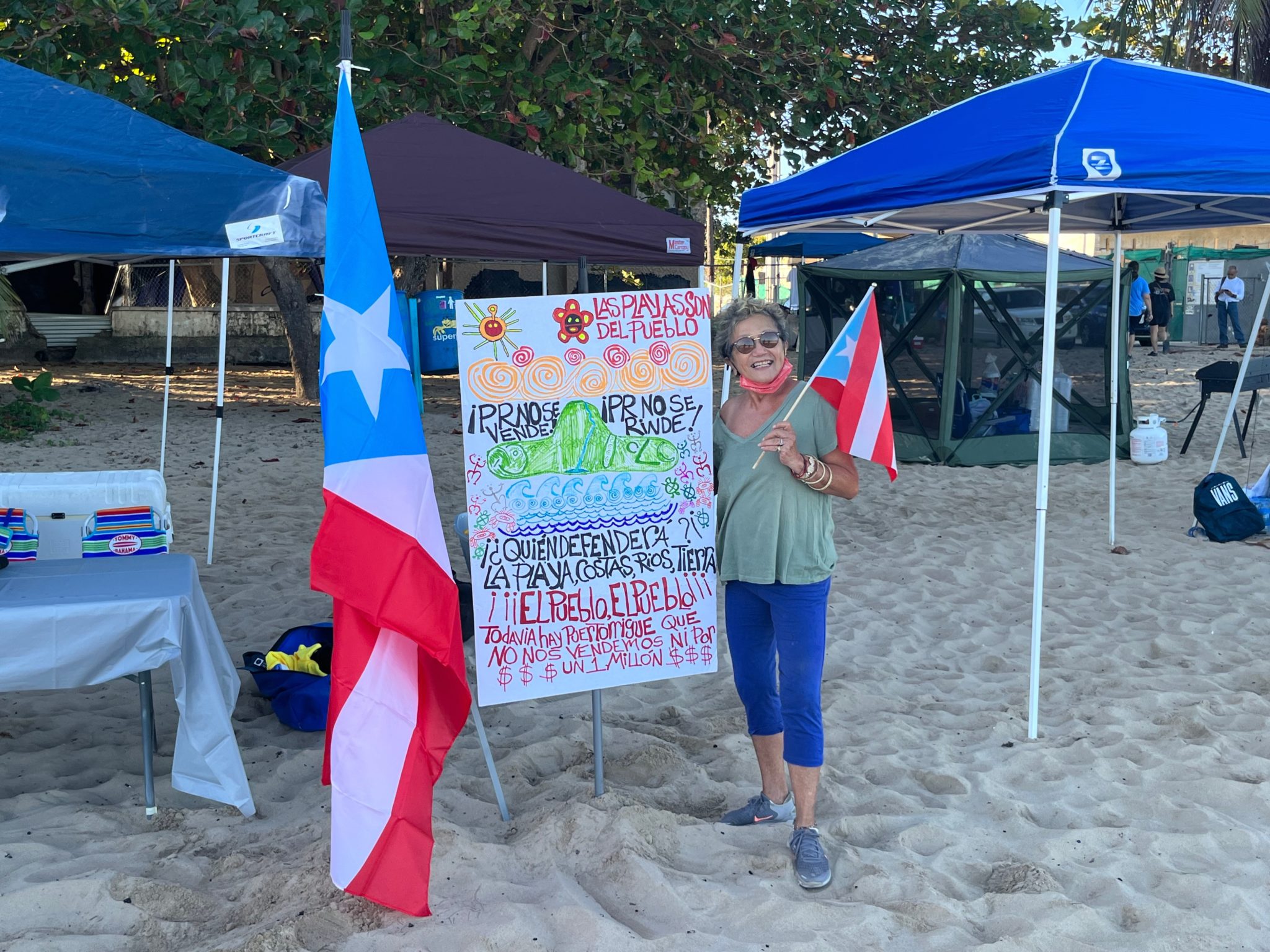

Photo by Carlos Edill Berríos Polanco/Latino Rebels
Ocean Park’s beachgoers have to find street parking in an already cramped neighborhood. Across the island, multiple parts of Dorado Beach are blocked off from the public by one of many beachfront hotels. Many beaches near tourist spots like El Escambrón beach have massive parking structures where you pay either by the day or by the hour.
“I work. I have a family. Sometimes I would rather spend the five dollars on lunch than parking,” said Pagan Calderín. “I would love to buy a house here but they’re simply too expensive. It doesn’t matter if there’s a lot of property for sale if we can’t buy it.”
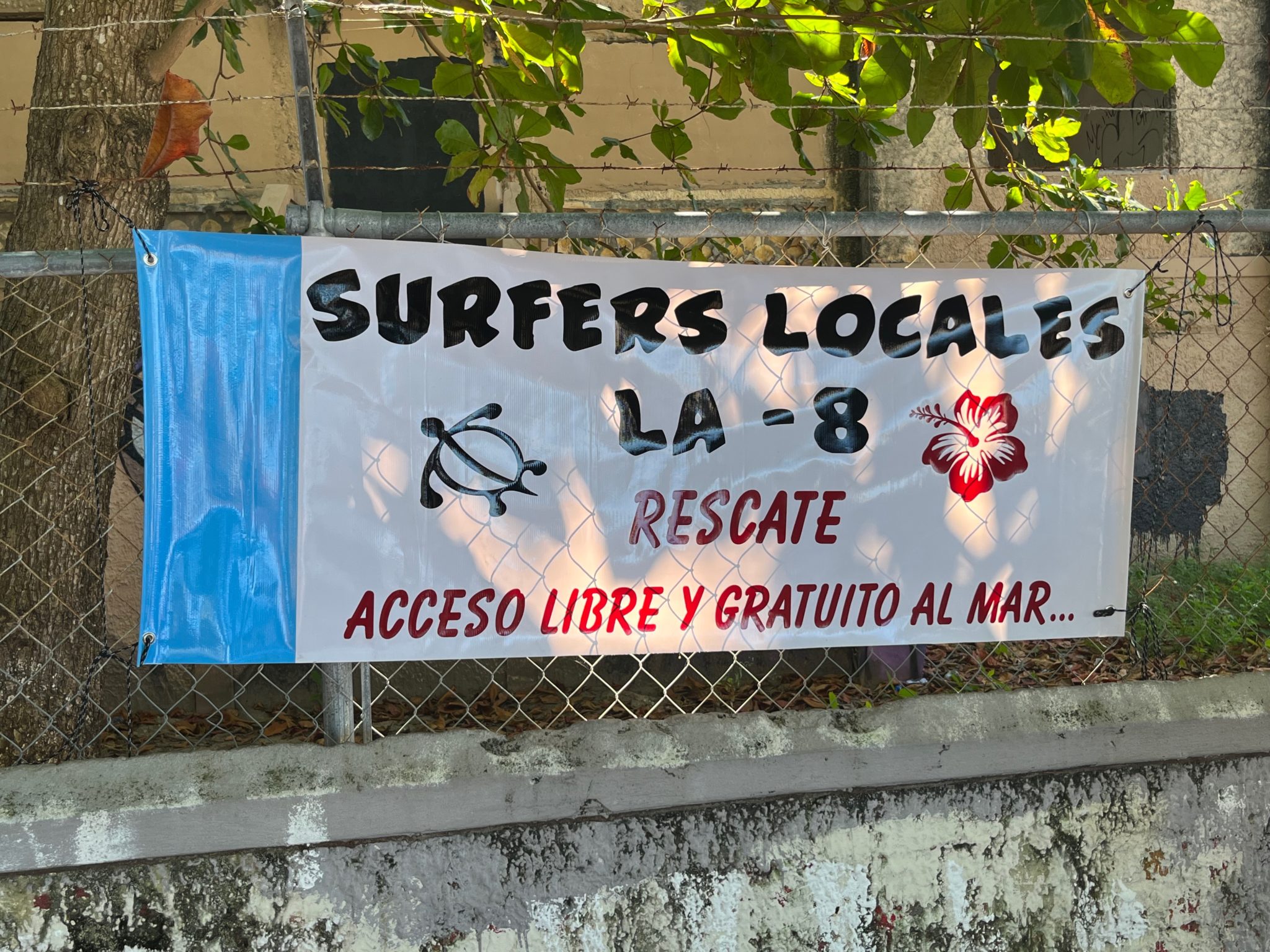

A banner posted by Surfers Locales La 8 calls for ‘free access to the sea.’ (Carlos Edill Berríos Polanco/Latino Rebels)
Over the years, Puerto Ricans have protested developments on the coast because they restrict access to beaches and because many have massive impacts on the local flora and fauna. In August 2021, many Puerto Ricans protested in Rincón where pools being built by a local construction project destroyed a nesting site of the hawkbill turtle, commonly called carey.
Ultimately, while Saturday’s protest was deemed a success by all in attendance, the sentiment echoed throughout the day by both attendees and organizers was that Puerto Rico’s beaches should be free for everybody.
***
Carlos Edill Berríos Polanco is a freelance journalist, mostly focused on civil unrest, extremism, and political corruption. Twitter: @Vaquero2XL



A little legal clarification is in order: in terms of legal procedure Puerto Rico is virtually identical to all other jurisdictions under the US flag but the bulk of Puerto Rico’s substantive law, including that which has to do with property rights, is derived from Spain’s 1889 Civil Code which was derived in turn from the so-called Civil Code enacted by Napoleon I in the early 19th century and which is the basis of the “European”, “Continental”, “Roman” or “Civil Law” system which differs substantially in many key areas from English Common Law. Under the Civil Law system, ALL beaches are public property and cannot be privatized, fenced off or otherwise limited in terms of public access, to the point where easements and “rights of way” are established at suitable distances, EVEN THROUGH PRIVATE PROPERTIES, to GUARANTEE public access to beaches. Private property rights pertaining to plots of land adjacent to beach areas legally STOP several yards or meters SHORT of the high-water mark in all beaches.